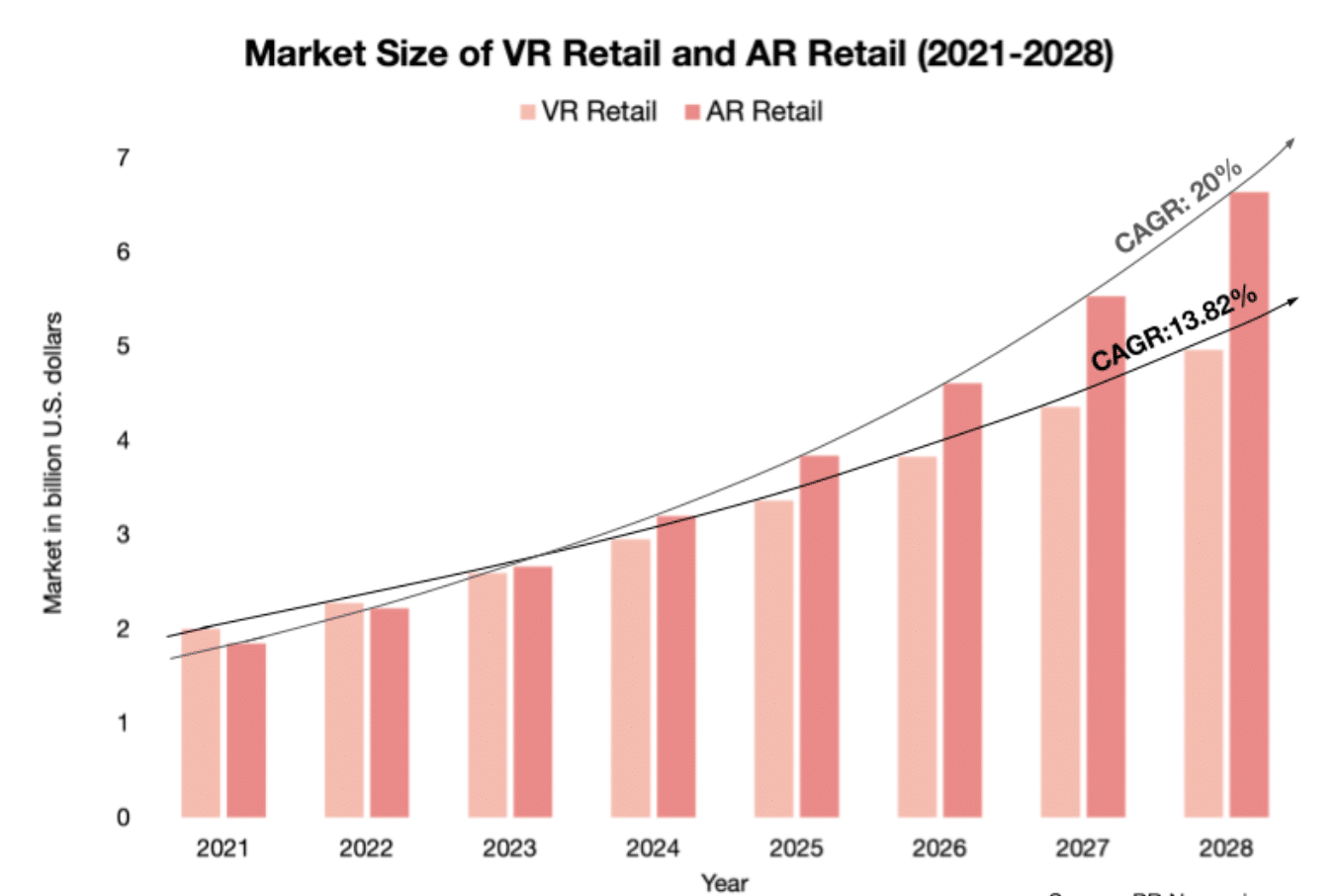V-Commerce: The Future of Online Shopping?
31/01/23
6'
The way people shop online is rapidly evolving, and new technologies are becoming increasingly popular among consumers. V-Commerce, short for virtual commerce, has emerged as the next big thing in the world of e-commerce. V-Commerce is a type of online shopping that uses virtual reality technology to provide customers with an immersive, 3D shopping experience. With V-Commerce, customers are able to “walk” through stores, browse items, and make purchases without ever leaving the comfort of their own homes. This type of virtual shopping has the potential to revolutionise the way people shop, making it easier and more enjoyable than ever before. It is estimated that the VR retail solutions market will reach $5.5 billion by 2028, while the AR retail market size is expected to grow to $6.7 billion.
In this article, we’ll explore the basics of V-Commerce and look at how it could shape the future of online shopping.
What Is V-Commerce?
The introduction of V-Commerce is a revolutionary way for how people shop online. It is a form of online shopping that combines virtual reality (VR), augmented reality (AR) and artificial intelligence to create an immersive and interactive shopping experience. By providing customers with a virtual store, V-Commerce allows them to browse and purchase products in a way that is similar to a real-life shopping experience.
This technology not only allows customers to shop from the comfort of their own sofas, but also provides them with a more customised, interactive, and engaging shopping experience. It is heavily based on AR technology to enhance the physical world with digital visual elements, sound, or other sensory stimuli. The graph below shows the growth potential and market value (source: PR Newswire).

Benefits of V-Commerce
V-Commerce has a significant impact on the retail industry by offering a range of benefits to retailers and brands. The most important and overall advantage is better convenience for customers, as the benefits mentioned beneath will illustrate.
One such benefit is an increase in conversion rates. Virtual stores enabled by V-Commerce platforms for example can convert web visitors into paying customers more frequently than traditional stores due to the convenience and immediacy of the shopping experience. Additionally, virtual stores often offer significantly lower prices than their physical counterparts, providing buyers with an incentive to shop. Brands have found that the adoption of VR in e-commerce can increase online shopping conversion by 17%, which is significantly higher than the average e-commerce conversion rate of around 2% (Source: Brandlab360).
Another benefit of V-Commerce is the ability to offer a more personal approach to customers. These platforms allow experts to engage with customers in real-time, providing tailored marketing that caters to individual shoppers’ interests and needs. This personalised approach can help to increase sales.
Finally, V-Commerce allows retailers to reach customers in areas where traditional brick-and-mortar locations may not be feasible. Virtual stores can be quickly set up and operated without requiring physical space or a workforce, enabling brand owners to respond quickly to market trends and customer demand.
Examples of the Use of V-Commerce

Image credit: IKEA
Here are some examples of how V-Commerce can be used:
- Ikea has introduced V-Commerce by creating a virtual reality app that enables customers to preview how furniture would look in their room before purchasing, with a 98% precision rate. The app also includes a 3D room planner and virtual showroom, enabling customers to experiment with various furniture layouts and styles in their own space. By utilising VR technology, Ikea improves the customer’s shopping experience and makes it more interactive, resulting in increased conversion rates and customer satisfaction.
- Levi’s, the clothing company, has also implemented V-Commerce by creating a virtual reality fitting room experience. Customers can use VR headsets to try on different styles of jeans and see how they look on their own bodies in real-time. This allows customers to easily visualise how the clothing will fit and look on them, and make more informed purchase decisions.
- Sephora has implemented V-Commerce through the creation of a virtual reality makeup try-on experience. With VR headsets, customers can virtually try on various makeup products and see how they look on their own faces in real-time. This feature enables customers to preview the appearance of the makeup on their own face, enabling them to make better-informed purchasing decisions.
- Ray-Ban‘s AR tool, called Ray-Ban Try-On, enables customers to virtually try on the company’s sunglasses. They can either upload a photo of their face or use the camera to get a close-up view of how the sunglasses look on them. This feature allows customers to preview the appearance of the sunglasses on their own faces before making a purchase, providing a convenient and interactive shopping experience.
Furthermore, Virtual stores, or V-stores, use advanced technology to provide personalised experiences for each customer, helping to build trust and brand loyalty. These stores allow brands to create unique digital storefronts and deliver innovative and engaging shopping experiences tailored to each customer’s needs. Especially virtual home design services are gaining popularity, allowing users to design their homes virtually with the assistance of experienced designers. With the use of AR, customers can preview their designs before making any purchases, creating an immersive and interactive experience that is not possible with traditional methods.
Augmented Reality in e-commerce
Give your customers a new shopping experience with Augmented Reality! …
Learn moreWhat Does the Future Hold in Store?
The future of V-commerce looks promising. As technology continues to evolve, more and more brands will start to take advantage of virtual reality and augmented reality to provide their customers with an immersive shopping experience. Companies are already starting to experiment and explore new ways to enhance the customer experience, such as using facial recognition to personalise product recommendations and using artificial intelligence to provide more tailored customer service. With the proliferation of 5G technology, V-commerce will become even more widespread, providing customers with faster and more reliable connections for more seamless online shopping experiences. As V-commerce continues to become more integrated into mainstream online shopping, it will open up new opportunities for businesses to expand their reach and increase their customer base.
In order to further enhance the V-commerce experience, companies should prioritise refining personalised techniques that deliver exceptional experiences tailored to each customer’s specific needs. One strategy for achieving this is to utilise Artificial Intelligence (AI) and Machine Learning (ML) to analyse customer data and provide personalized recommendations.
Moreover, V-Commerce and the metaverse (virtual worlds where users can interact with each other and a wide range of digital assets) can be combined in a number of ways to create unique and immersive shopping experiences. Here are a few potential options:
- Virtual stores in the metaverse: Retailers can create virtual stores within the metaverse, allowing customers to browse and purchase products in a fully immersive and interactive environment.
- Virtual try-on experiences: Brands can create virtual try-on experiences within the metaverse, allowing customers to try on clothing or makeup products in a virtual setting before making a purchase.
- Virtual events and pop-up shops: Brands can host virtual events and pop-up shops in the metaverse, providing customers with a unique and interactive shopping experience.
- Virtual product demonstrations: Brands can demonstrate and showcase their products in a virtual setting within the metaverse, allowing customers to get a more in-depth understanding of the products and how they work.
Outlook
V-Commerce is set to revolutionise the way we shop online. With its immersive, interactive shopping experience, it has the potential to completely transform the way we purchase goods and services online. V-Commerce promises to provide an engaging, entertaining and efficient way to shop, while also increasing user engagement and enhancing customer satisfaction. As the technology continues to develop, it could well become the future of online shopping.
Your e-commerce library
E-commerce for Retailers
Learn moreE-commerce for Brands
Learn moreL'Oréal Luxe Success Story
Learn moreSign up for our newsletter
By submitting this form you authorize Lengow to process your data for the purpose of sending you Lengow newsletters . You have the right to access, rectify and delete this data, to oppose its processing, to limit its use, to render it portable and to define the guidelines relating to its fate in the event of death. You can exercise these rights at any time by writing to dpo@lengow.com

Trending Posts
Marketing channels
Where does Gen Z shop online?
Gen Z online shopping is transforming the digital marketplace, setting trends that redefine what it means to engage with brands…
16/04/24
9'
Marketplaces
The Top 10 Marketplaces in Europe
The e-commerce scene is a vibrant mix of marketplaces in Europe. These aren't just websites; they're bustling hubs where millions…
08/12/23
7'
Marketplaces
Lengow Now Fully Supports Zalando Logistics Solutions ZSS and ZRS
Zalando, one of Europe’s leading fashion marketplaces, continues to raise the bar with its advanced logistics and fulfillment programs. After…
12/12/24
4'
Marketplaces
How to win the Buy Box on Marketplaces (Amazon, Zalando, etc.)
What is the most important thing for marketplace sellers? Exactly, the Buy Box! If you don't have the Buy Box…
02/04/24
10'
Marketplaces
How to Sell on Temu? Best Tips
Emerging under the vast umbrella of PDD Holdings Inc., Temu has skyrocketed in popularity as a shopping sensation from China…
17/08/23
5'




